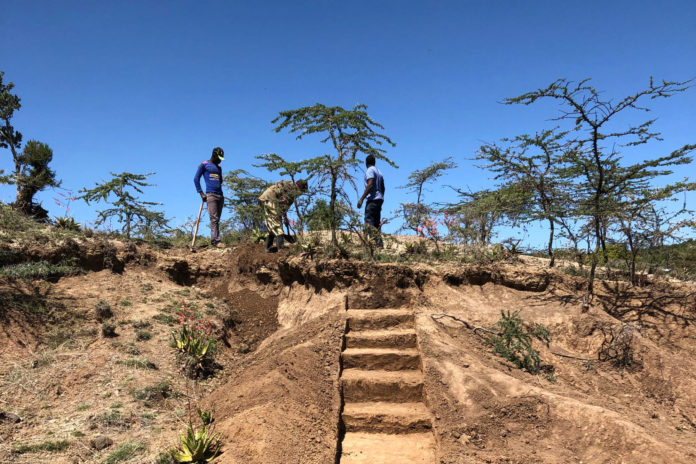
MACON – A group of researchers led by Dr. Francis Kirera, assistant professor of anatomy at Mercer University School of Medicine, conducted three weeks of field research in December at a recently discovered early human site in the Central Highlands region of Kenya.
Kenya is well known for its rich collection of early human fossil remains. However, most of these fossils were recovered from limited sites located along the East African Rift Valley. The discovery of new fossils in the Central Highlands is a rare occurrence, Dr. Kirera said.
“Our research team was very fortunate to conduct field research and document the first evidence of early human activities from this unique new site,” he said. “This research opened a new frontier in the study of human origins: the fossils and stone artifacts from the site show for the first time that early humans and other prehistoric mammals in East Africa were geographically much more dispersed than it is currently reported in the paleontological literature. These findings provide further evidence that early humans were inhabiting and exploiting resources in high altitudes and much colder mountainous environments.”
Over three weeks, Dr. Kirera’s research team was able to recover more than 100 fossil specimens belonging to different mammalian groups including antelopes, equids (horse family), hippos and primates. In addition, the researches spotted various stone tools including hand axes, projectiles, bifaces, points and scrapers.
The team’s future research objectives are to recover more fossils and stone tools, to conduct detailed excavations and to establish the geological context of the artifacts. The team is also working closely with local communities and the county government to have the area designated as a prehistoric site.
Other researchers collaborating in the study include Dr. Jillani Ngalla of the National Museums of Kenya, Professor Eliud Mathu of South Eastern Kenya University, Professor Christopher Nyamai of the University of Nairobi and Dr. Nasser Malit of Potsdam University in New York.
Due to the significance of this research and the uniqueness of the new site in the prehistory of Kenya, the field research was featured in the Daily Nation, one of the leading newspapers in Kenya.
About Mercer University School of Medicine (Macon, Savannah and Columbus)
Mercer University’s School of Medicine was established in 1982 to educate physicians and health professionals to meet the primary care and health care needs of rural and medically underserved areas of Georgia. Today, more than 60 percent of graduates currently practice in the state of Georgia, and of those, more than 80 percent are practicing in rural or medically underserved areas of Georgia. Mercer medical students benefit from a problem-based medical education program that provides early patient care experiences. Such an academic environment fosters the early development of clinical problem-solving and instills in each student an awareness of the place of the basic medical sciences in medical practice. The School opened a full four-year campus in Savannah in 2008 at Memorial University Medical Center. In 2012, the School began offering clinical education for third- and fourth-year medical students in Columbus. Following their second year, students participate in core clinical clerkships at the School’s primary teaching hospitals: Medical Center, Navicent Health in Macon; Memorial University Medical Center in Savannah; and The Medical Center and St. Francis Hospital in Columbus. The School also offers master’s degrees in family therapy, preclinical sciences and biomedical sciences.









